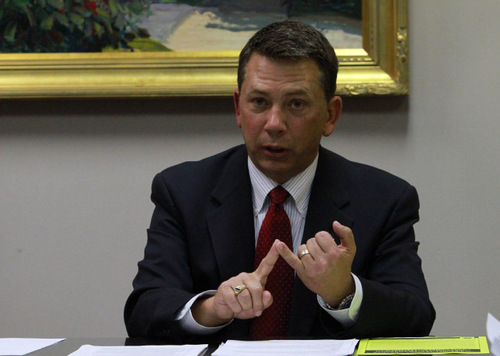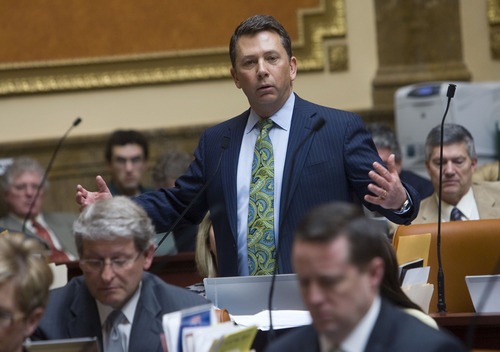This is an archived article that was published on sltrib.com in 2011, and information in the article may be outdated. It is provided only for personal research purposes and may not be reprinted.
State Rep. Stephen Sandstrom and Sen. Curt Bramble may be attempting to cobble together a deal allowing Utah to adopt a tough employer sanctions bill modeled after Arizona's law while keeping Utah's controversial guest worker law from being repealed entirely.
The Orem Republican said he expects to incur political heat for moving away from those who only support a repeal of HB116, but he said an E-Verify law that hews to what Arizona passed in 2009 would alleviate many of the concerns he has on the issue of illegal immigration.
"I am open to negotiation," Sandstrom told The Tribune in an interview.
The two lawmakers had preliminary phone conversations Wednesday and were attempting to set up a meeting to discuss a workable solution. Bramble, a Republican from Provo who was a key player in getting HB116 passed, said he welcomed the opportunity to try to work toward a deal.
"I think there is room for movement on both sides," Bramble said.
The talk of negotiations comes just a month after a resolution calling for the repeal of HB116 passed at the Republican State Convention 833-739. That law has been a lightning rod of controversy within the GOP, pitting traditionally conservative groups like the Sutherland Institute and the Salt Lake Chamber of Commerce against an energetic tea party movement that has used its rank and file to put pressure on lawmakers to seek tough enforcement on illegal immigration.
Sandstrom has become a focal point of that movement, leading the charge with Rep. Chris Herrod, R-Provo, on the repeal of HB116 while getting his enforcement-only bill signed into law in March. Sandstrom refused to attend the signing ceremony for his own bill, however, as a protest against the passage and signing of HB116 into law. His enforcement-only bill is currently tied up in federal court, however, and a hearing is scheduled for Sept. 2.
But then Sandstrom saw the U.S. Supreme Court's 5-3 ruling in May that upheld Arizona's E-Verify law as an opportunity to bring a strict employer-sanction bill to the Utah Legislature and said having tough penalties in place would help halt illegal immigration into Utah.
He called the E-Verify portion of HB116 "weak" and said his bill would include sanctions against employers that didn't use the Internet-based E-Verify system aimed at screening out undocumented job applicants and hired workers here illegally. Those sanctions would include revoking business licenses on second offenses.
"People in Utah are saying to go after the businesses," Sandstrom said. "This is the way I think we can do that."
Brandon Beckham, who has helped spearhead the effort to repeal HB116, said he needed to know more details before being able to endorse any kind of compromise. However, he said he was supportive of the E-Verify bill.
But he said the issue of HB116 being unconstitutional remains a huge hurdle for the law to overcome and was skeptical a deal could be reached that addressed that concern.
"That's where we draw a line in the sand," he said.
Sandstrom said he also believes "HB116 is flawed legislation" and wants changes to the bill as well, including a provision that allowed those arriving in Utah prior to May 10 to qualify for a guest-worker permit. He said the way the law is written, it allows anyone who entered or lived in Utah prior to that date to obtain a permit and would lead to an influx of undocumented immigrants.
The HB116 law doesn't take effect until July 2013 and would require federal government approval. However, HB116 was written to address the estimated 110,000 undocumented immigrants in the state and would require each undocumented immigrant to pay a fine of either $1,000 for an overstayed visa or $2,500 for entering illegally.
It also requires undocumented immigrants to pass background checks before being granted the state-issued visa to work.
Supporters of HB116, including the LDS Church, have argued it's a compassionate approach to the immigration issue, and Utah's approach has been the subject of national attention. And Marty Carpenter, spokesman for the Salt Lake Chamber, said "there are a lot of moving parts" regarding E-Verify, including bills in Congress that would nationalize the program. Carpenter said the chamber remains supportive of HB116.
However, many opponents of the law remain unconvinced it's a practical solution.
Ron Mortensen, co-founder of the Utah Coalition on Illegal Immigration, said anger over the law still hasn't dissipated.
"I don't know how they'll change HB116 around to comply with the [Republican] platform," Mortensen said. "I don't think changing it will diffuse the anger towards those who pushed HB116."
Sandstrom is scheduled to meet with Gov. Gary Herbert next week to discuss the issue.
dmontero@sltrib.comTwitter: @davemontero





